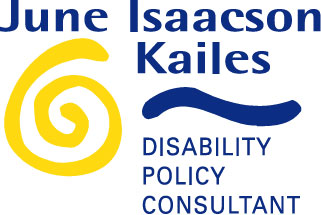

Advocacy

Archived
Page (provided for
reference, but no longer updated)
Advocacy:
Reality or Rhetoric Inventory,
1999, 5 pages,
A tool that
helps evaluate an independent living center's or
other disability related organization's level of commitment to advocacy
and
systems change.
Makes the
case that, as leaders, we must take the time to
help others move from being held back and locked out by internalized
oppression
to moving toward adopting a rights-bearing attitude. Dealing with
oppression
means helping people move from destructive, depressing, internalized
anger to
focused, energy-enhancing, externalized anger. It means moving from
passivity
to activity. It means moving from identifying as a poor oppressed
cripple to
identifying as a person with a disability who has rights, pride,
passion and
power! Suggests strategies for assisting with this transition. People
have to
get angry and converting oppression to anger means converting anger to
action
and power. Also discusses how people in the movement should not
inadvertently
become the oppressor.
Building and
Maintaining
Relationships with Elected Officials,
1998, 19 pages,
Covers items
to consider as you work to build and maintain
relationships with elected representatives. Offers strategies on to how
to
build a profile, plan for, carry out and follow through on visits with
elected
officials.
Disability Pride: The
Interrelationship of Self-Worth, Self-Empowerment, and Disability
Culture, published by
the Independent Living
Research Utilization (ILRU) Research and Training Center on Independent
Living,
Houston, 1993, 84 pages,
Practical
and easy to use idea kit for people who facilitate
advocacy training and skill building. Consists of over 20 different
handouts,
exercises and activities utilizing tools and techniques to assist
advocacy
training facilitators in helping people examine: how common stereotypes
about
disability influence self-image and feelings about disability;
disability
culture as the common experience among people with disabilities; and
the
importance of disability identity and pride as related to
self-empowerment.
Putting
Advocacy Rhetoric Into Practice: The Role of the Independent Living
Center, 32 pages,
published by the Independent Living Research
Utilization (ILRU) Research and Training Center on Independent Living,
Houston,
1988,
This
monograph challenges people involved in managing
Centers for Independent Living to ensure advocacy has a priority
prominent
position. Topics covered in detail include: why advocacy is so
important;
advocacy and service: the dual commitment; establishing an effective
systems
advocacy approach; advocacy's place in direct services; independent
living
networks; lobbying; need to determine advocacy priorities; development
of new
disability leadership; preventing or reducing the impact of burn-out;
cloning;
devoting significant time and resources to systems advocacy; what
constitutes
representative community input; who is responsible for systems
advocacy; threat
of co-optation; and much more! A must-read for serious board members,
advocacy
skill trainers, staff and volunteers of Centers for Independent Living
or
disability-related organizations by, for, or of people with
disabilities.
Tips for Effective Goal Setting, 1997, 2 pages,
Value Your
Time, Be Clear About Your
Goals and Why You are Agreeing to Join, and Avoid Tokenism, 2002, 9
pages,
Includes
hard-hitting questions to
ask before you join a board, group, committee, task force, panel or
advisory
council, and a checklist for those behaviors that may represent
tokenism in the
context of being a member of any of these groups. See Kailes, J.,
(2008) Community
Organizing: Ground Rules for Grass Roots Organizers, CENTER
FOR
INDEPENDENT LIVING Management Center & RRTC on independent living
Management

 jik@pacbell.net
jik@pacbell.net
© 1998 - 2018 June Isaacson
Kailes, Disability Policy Consultant, All Rights Reserved.
Created 04.1.16
| Updated 04.5.16